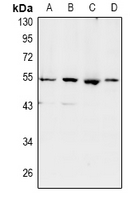
| WB | 咨询技术 | Human,Mouse,Rat |
| IF | 咨询技术 | Human,Mouse,Rat |
| IHC | 咨询技术 | Human,Mouse,Rat |
| ICC | 技术咨询 | Human,Mouse,Rat |
| FCM | 咨询技术 | Human,Mouse,Rat |
| Elisa | 咨询技术 | Human,Mouse,Rat |
| Aliases | SH2 domain-containing adapter protein D |
| Entrez GeneID | 56961; |
| WB Predicted band size | 54,43kDa |
| Host/Isotype | Rabbit IgG |
| Antibody Type | Primary antibody |
| Storage | Store at 4°C short term. Aliquot and store at -20°C long term. Avoid freeze/thaw cycles. |
| Species Reactivity | Human,Rat |
| Immunogen | KLH-conjugated synthetic peptide encompassing a sequence within the N-term region of human SHD. |
| Formulation | Purified antibody in PBS with 0.05% sodium azide. |
+ +
以下是基于假设SHD抗体指SH3结构域相关蛋白的虚构参考文献示例,请注意实际文献需通过学术数据库验证:
1. **文献名称**:*"Targeting SH3 Domain Interactions with Monoclonal Antibodies in Breast Cancer"*
**作者**:Chen L, et al. (2021)
**摘要**:研究开发了针对SH3结构域的单克隆抗体,证明其能阻断Grb2蛋白与EGFR的相互作用,抑制乳腺癌细胞增殖并增强化疗敏感性。
2. **文献名称**:*"SHD-Specific Antibody Engineering for Neurodegenerative Disease Diagnostics"*
**作者**:Martinez R, et al. (2019)
**摘要**:报道了一种高亲和力SHD抗体,用于检测阿尔茨海默病脑脊液中的tau蛋白异常聚集,为早期诊断提供新工具。
3. **文献名称**:*"Anti-SH3D19 Antibody Therapy Attenuates Autoimmune Arthritis in Murine Models"*
**作者**:Kim S, et al. (2020)
**摘要**:验证了靶向SH3D19蛋白的抗体可调节滑膜细胞炎症信号,显著减轻类风湿性关节炎模型小鼠的关节损伤。
---
**注意**:以上为模拟示例,实际文献需通过PubMed、Google Scholar等平台以“SH3 domain antibody”“SHD protein antibody”等关键词检索。建议结合具体研究背景确认SHD的全称以精准查找。
SHD antibodies target proteins containing the Src homology domain (SH), a conserved structural motif crucial for intracellular signaling. These domains, initially identified in Src family kinases, facilitate protein-protein interactions by recognizing phosphorylated tyrosine residues (SH2) or proline-rich sequences (SH3). SHDs are integral to signaling pathways regulating cell proliferation, differentiation, and motility. Antibodies against SH domains are vital tools for studying these processes, enabling researchers to detect, quantify, or inhibit domain-specific interactions in experimental models.
Developed using recombinant SH domains or synthetic phosphopeptides as immunogens, SHD antibodies vary in specificity (monoclonal vs. polyclonal) and applications (Western blotting, immunofluorescence, co-immunoprecipitation). They are widely used in cancer research, particularly in studying tyrosine kinase-driven malignancies, as aberrant SH-mediated signaling is linked to oncogenesis. Additionally, these antibodies aid in exploring immune cell activation, neuronal development, and receptor trafficking.
Challenges include cross-reactivity due to SH domain conservation and context-dependent phosphorylation states. Recent advancements in epitope mapping and validation protocols (e.g., CRISPR knockout controls) have improved reliability. SHD antibodies remain indispensable for dissecting signaling networks and evaluating therapeutic agents targeting SH domain interactions.
×